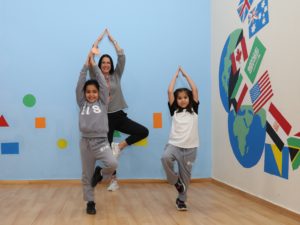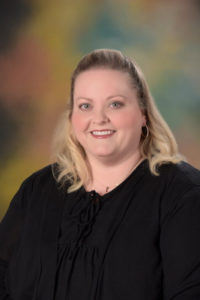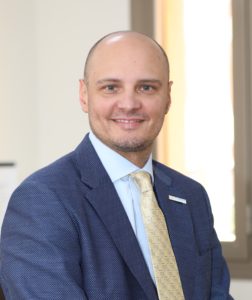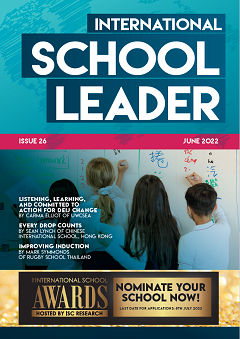By Zak Palsha and Jamie Smith
Al-Bayan International School received a special commendation at the 2022 International School Awards for introducing extensive inclusive education in Kuwait.
Around the world, people with disabilities have endured struggles academically and socially. Unfortunately, it was not uncommon in the past for these students to suffer from abuse, negligence and ridicule. In the Arab world, a disability stigmatisation complicates acceptance and education due to parents’ initial and sometimes prolonged denial and rejection of disability. The attitude towards inclusion in Kuwait has historically been a challenge, with separate schools established for students with special needs, even for mild or moderate disabilities. These students are categorised into three groups – Down Syndrome (DS), Slower Learner (SL), and Learning Disabilities (LD) – and are largely excluded in self-contained separate classrooms or enrolled in schools that are specifically for students with disabilities. Now schools like ours are making strides to change this mindset and move to an inclusion model of education that benefits all students.
Originally founded in 1993 as a non-profit school, Fawzia Sultan International School (FSIS) was the first school in the Middle East dedicated to serving the educational needs of children with learning differences. In 2017, the school was renamed Al-Bayan International School (BIS) and began the transition from a self-contained special education model to an inclusion model. Over the past five years, BIS has embraced the mission of creating a school that promotes justice and enhances the learning and performance of all children in a school where diversity is valued and an inclusive environment aims to meet the individual academic and social-emotional needs of every student.
Creating the vision and building community
Our first step in creating an ethos of inclusivity began with the creation of our guiding statements. Our mission statement, which is the foundation of our decision-making processes, echoes this sentiment: ‘Al-Bayan International School personalises learning to achieve intellectual and individual growth of all students, empowering them to impact their community’.
We have pioneered these ideals by educating faculty, students, parents and the community on inclusion and the importance of valuing and educating every child. Throughout the year, parents are sent surveys to evaluate their feelings and knowledge of our inclusion programme. Parent diwaniyas (gathering) are held to give information and facilitate an open forum for discussion. Dedicating time and energy to parent communication has resulted in many parents who were previously opposed to inclusion becoming advocates for the programme. Parents are now choosing BIS because of our inclusion programme and because of recommendations from current parents who have experienced success, as well as referrals to our school from the Ministry of Private Education. This includes attracting families with students who are not part of our inclusion programme because of the inclusive practices that we teach, particularly around tolerance and empathy. This was something that we did not anticipate.
It was important to us that we create high expectations for all students. Adopting American Education Reaches Out (AERO) standards was a positive step toward building the framework of a curriculum that is standards-based, outlining what students are expected to learn in core content classes by the end of the school year, while offering a clear understanding of how to differentiate instruction based on standards allowing all students to be taught the same material as their classmates.
Developing school culture
Our school culture defines the values, expectations, beliefs and assumptions of everyone from administrators to students. Students must feel safe, secure and cared for in order to be ready to learn. Creating collaborative, supportive, respectful relationships among staff, parents and the community is vital. We believe a strong culture grows through repeat positive behaviour patterns.
As part of our guiding statements, our school adopted school-wide good habits: persisting, thinking flexibly and striving for accuracy, as well as common expectations of empathy, respect and self-discipline. These ideals are explicitly taught and practised in classrooms, and student recognition and awards are given to students who demonstrate and model these expectations.
Addressing cultural diversity is another important factor of inclusion. In our transition to becoming an international school, our student population changed. Finding ways to develop friendships, relationships and mutual respect between all children, teachers and parents is a vital component of inclusive practices.

Shared responsibility
For inclusion to become part of the school culture, the entire staff must be committed to the philosophy, be able to articulate the reasons for inclusive education, defend the practice against detractors, and be willing to plan and deliver multi-level, authentic instruction for learners with diverse needs and abilities.
To do this effectively, it is crucial that students and teachers are given the support they need. In reality, whether a school identifies as inclusive or not, you will have students functioning 3 to 6 grade levels apart. We also know all students’ optimal learning style varies. Our staff embrace this diversity of ability and make it part of the design of instruction, specifically targeting differentiation strategies that help tailor their teaching.
Common planning time is built into the master schedule for teachers to plan and identify gaps in teaching and inclusion, and intervene sooner to correct them. All staff members participate in bi-monthly professional learning community meetings where assessment data is analysed and reviewed.
A dedicated team of educational psychologist, a speech language pathologist, guidance counsellors, resource teachers and instructional coaches provide services in addition to bilingual education assistants who assist in the classrooms daily. These professionals can provide information and suggestions to help all students, including those who are not eligible for special education but still need extra support. Our formal intervention team meets weekly to talk about any special problems or needs and to brainstorm ways to deal with the issues. Resource teachers collaborate with teachers and work together to meet the needs of students. Teachers weave in specially designed instructional support that can help students make progress. These strategies are helpful for all students, such as using fidget toys or allowing flexible seating. Students also have regular class meetings called Community Circle where they practise mindfulness and learn about self-regulating behaviours.
Reaping the rewards
Supporting and celebrating diversity and inclusion in school works because it gives all children the potential to achieve and creates an environment where those with additional needs are not segregated or seen as ‘other’; they are part of the same community of learners.
Our inclusion initiative is an ever-evolving process as we are in constant reflection and refinement. Inclusive practices make learning and academic success possible for everyone when they are built into the ethos of the system.
Tips for building inclusive practices
- Establish a clear philosophy of what inclusion means within the context of your school
- Look at all children through the lens of what they can do rather than what they cannot do
- Teacher collaboration is a must
- Communication and parent education/outreach
- Ensure there are adequate support staff to meet the needs of learners and teachers and provide them with professional development and training

 Dr Zak Palsha is Director and Jamie Smith is Curriculum, Instruction and Assessment Coordinator at Al-Bayan International School, Kuwait. Connect with Zak on LinkedIn or Jamie on LinkedIn.
Dr Zak Palsha is Director and Jamie Smith is Curriculum, Instruction and Assessment Coordinator at Al-Bayan International School, Kuwait. Connect with Zak on LinkedIn or Jamie on LinkedIn.


